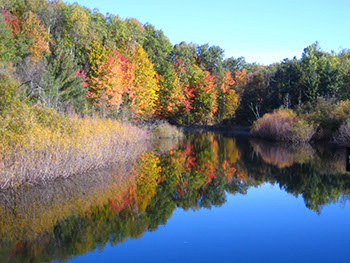 |
The abundance of Chinook and coho salmon in the Betsie and Platte rivers every September – during what are known as “fall fish runs” – draws anglers eager for this unique fishing opportunity in northwest Michigan. Unfortunately, the season also sometimes brings illegal fishing activity and community disruption, and Michigan Department of Natural Resources conservation officers are working with local property and business owners to improve the situation.
Conservation officers are conducting enhanced patrols to reduce violations ranging from illegal fishing, camping and parking to trespassing, littering and noise complaints.
“Local businesses and communities open their doors and welcome anglers every fall,” said Lt. Joe Molnar, the DNR's district law supervisor who oversees officers in northwest Michigan. “Many people treat the area and fishing resources with care and respect, but those who live and work in these communities are tired of those who continue to snag fish, litter and exhibit poor behavior.”
Snagging is an illegal method of catching a fish using hooks, without the fish having taken the bait with its mouth. Anglers are strongly encouraged to read the 2021 Fishing Guide for current rules and regulations.
“Snagging, littering and trespassing are common violations we see during the fish runs,” Molnar said. “Landowners have gone above and beyond to clearly post their private property but continue to experience trespassers wandering their land to get to the next fishing spot – often leaving a trail of litter.”
Molnar encourages anglers to walk through state-managed public land to avoid trespassing.
Protecting the river systems in northwest Michigan is essential for continued success in replenishing the Chinook and coho salmon populations.
“We currently have a healthy and popular salmon fishery on the Betsie and Platte rivers, and it’s important to remember that natural reproduction is an essential component of maintaining our healthy and robust salmon fisheries,” said Scott Heintzelman, DNR Central Lake Michigan Unit manager. “Following conservation laws and being good stewards of these aquatic systems is one way anglers can ensure strong salmon fisheries into the future.”
Those apprehended for illegally taking fish may be charged with a misdemeanor, lose their fishing license, serve jail time and face fines and costs.
For more on fall fishing opportunities and resources throughout the state, visit Michigan.gov/Fishing.
Anyone who witnesses a natural resources crime or has information about such a crime is encouraged to call or text the DNR’s Report All Poaching hotline at
800-292-7800. Tipsters can remain anonymous and may qualify for a cash reward. During 2020, the RAP hotline managed more than 41,000 calls, with over 9,100 complaints generated.
Michigan conservation officers are fully commissioned state law enforcement officers who provide natural resources protection, ensure recreational safety and protect citizens by providing general law enforcement duties and lifesaving operations in the communities they serve. Learn more at Michigan.gov/ConservationOfficers.


 Advertising
Advertising